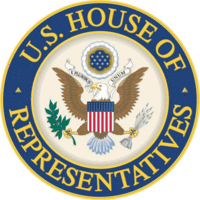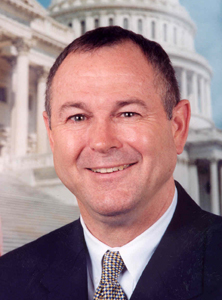 The House passed H.R. 6621 last night, on a vote of 308-89 (the roll call being demanded by Rep. Dana Rohrabacher over a request for a voice vote from the bill's sponsor, Rep. Lamar Smith). The substance of the substantive provisions of the bill, and their evolution since the bill was introduced, have been discussed in prior posts. Excerpts from the floor debate on the provisions, specifically Section 1(m) of the bill having to do with "pre-GATT" applications (i.e., applications that were filed prior to the change in U.S. patent law that made the patent term 20 years from earliest priority date rather than 17 years from grant date), are illustrative (and disappointingly so) when it comes to the extent to which at least these two legislators are misinformed about the legislation they pass and it's effects on the patent system.
The House passed H.R. 6621 last night, on a vote of 308-89 (the roll call being demanded by Rep. Dana Rohrabacher over a request for a voice vote from the bill's sponsor, Rep. Lamar Smith). The substance of the substantive provisions of the bill, and their evolution since the bill was introduced, have been discussed in prior posts. Excerpts from the floor debate on the provisions, specifically Section 1(m) of the bill having to do with "pre-GATT" applications (i.e., applications that were filed prior to the change in U.S. patent law that made the patent term 20 years from earliest priority date rather than 17 years from grant date), are illustrative (and disappointingly so) when it comes to the extent to which at least these two legislators are misinformed about the legislation they pass and it's effects on the patent system.
 First, Rep. Rohrabacher (at right):
First, Rep. Rohrabacher (at right):
Mr. Speaker, I rise in strong opposition to H.R. 6621.
The bill being considered is being promoted as a technical corrections piece of legislation, and by and large that's exactly what it is. But also, there is one provision in this bill that raises significant concerns and needs to be addressed. I would ask my friend from Michigan perhaps to consider this and perhaps reconsider his position on the bill, because I'm sure he does not know about this.
Our country's patent system has long been one of the strongest in the world.
One of its basic tenets has been the steadfast adherence to the principle of total confidentiality of a patent application until the patent is granted. Congress has repeatedly stood by that principle even though there have been many powerful forces in this country trying to eliminate that concept, but we've stood by this principle that these applicants should have confidentiality as their application works its way through the patent system. It prevents the big guys with money and power from attacking and neutralizing the little guys with genius but few resources.
H.R. 6621 threatens to disrupt this longstanding practice and principle by requiring the United States Patent and Trademark Office to submit a report to Congress on certain patent application sections. This report, as mandated by this bill, will include information about the applications that have been traditionally kept confidential, including the name of the inventor, which has always been confidential to prevent these inventors from attack by very powerful interests who would steal their invention.
While the technical contents of the applications would be most likely not included in the report, this legislation requires the PTO, in their report to Congress, to report the names of the applicants.
* * *
There is a requirement to report the names [of the inventors], so this bill requires in this report to have the names of the applicants and other identifying information that could be used by powerful outside groups -- yes, read that foreign and multinational corporations -- to make these applicants potential targets even before their patent is granted.
Anonymity could easily be accomplished by a simple change to one section of this bill. Perhaps the PTO could create a unique identifier for each applicant so that they could easily be tracked but without giving risk that the public would know about this and be able to identify the inventor.
We can make this a good bill. We just need to take a couple words out of it or one small section out of it, because as the ranking member suggested, it does a lot of good, but it does a lot of harm, much more harm, unless we take this out of the bill.
So I would ask my colleagues to oppose this legislation until it is perfected so we are not going to hurt the little inventors and hurt our country's ability on the technology front by trying to make a few technical corrections to the way the Patent Office does its job.
(emphasis added).
Admirable sentiments, and Rep. Rohrabacher raises many of the issues regarding the consequences of a lack of confidentiality that were raised 14 years ago, when the American Inventors Protection Act of 1999 was passed. The AIPA mandated publication of U.S. applications 18 months after their priority date, unless the applicant certified that no foreign filings would be made (the rest of the world having been publishing applications at the 18-month date for a generation). The time for the fight for confidentiality has passed, and while it remains for the "pre-GATT" cases (as well as any pre-AIPA cases that may exist), not only the application but the complete prosecution file history is public in real time, as the result of a decision by the Director when implementing the AIPA.
 It may be bad enough that Rep. Rohrabacher is behind the times; Rep. Smith's (at right) understanding of the reasons for the persistence of the pre-GATT cases is worse:
It may be bad enough that Rep. Rohrabacher is behind the times; Rep. Smith's (at right) understanding of the reasons for the persistence of the pre-GATT cases is worse:
Mr. SMITH of Texas. . . . The report on pre-GATT applications refers to applications that were filed prior to the Uruguay Round amendments taking effect in June 1995. The 103rd Congress intended for a brief transition period as the United States patent system was updated. Unfortunately, a small number of applicants have engaged in clearly dilatory behavior and continue to maintain pending applications with effective filing dates that predate 1995. In fact, some of these applications have been pending for 20, 30, and even 40 years.
The 103rd Congress never intended for such applications to stay pending for half a century. To remove such technology from the public domain in 2012, would bear no relation to the patent system's Constitutional purpose to promote the progress of science and the useful arts.
Now it is important for the 113th Congress and the Public to learn fully about these applications from the USPTO. The Committee expects that the report will contribute to an understanding of whether these applications present special circumstances that require further action to protect the public's interests.
Those who may have concerns about this report must understand that there is no way to "target'' these submarine applications -- the targets are, in fact, the people who will be sued once these submarine patents surface. The real targets are American job creators like small businesses, innovators and university researchers. And the public has a right to know in advance if certain widely used and long known technology is about to be withdrawn from the public domain.
The patent system was never intended to be a playground for trial lawyers and frivolous lawsuits. Sound patents should issue in a timely manner and should be used to create wealth and jobs.
(emphasis added).
Now let's be clear: there is little evidence that applicants have "gamed" the system to delay grant and indeed there is ample evidence that applicant delay was not a factor. (The strategic misuse of the term "submarine patent" might have appeared apt to Rep. Smith at the time, but that term was coined to characterize patent applicants who took advantage of the 17-year term by avoiding prosecution in a strategic manner.) The majority of these applications have been involved in protracted interferences, appeals, or had examination suspended for Office consideration of third party interferences that would influence the patentability of pending claims. This does not require Rep. Smith to believe that all patent applicants are on the side of the angels: however, it would be good if the Congressman recognized that the implementing legislation and PTO rules concerning these patents were drafted expressly to prevent such shenanigans. Examples include the "transitional" procedures adopted by the Office that permitted an applicant to petition for withdrawal of the finality of a rejection no more than twice, wherein thereafter the only recourse for pre-GATT applications was filing an appeal. The current route for which applicants are accused of delaying, filing a continuation or Request for Continued Examination, strips these applications of their pre-GATT status (which in most cases would lead to the same loss-of-rights that the original version of the bill would cause). The Office's carefully crafted rules were designed to minimize long pendencies for pre-GATT cases, and that policy has been successful to the extent that the number of such cases has been limited to 200.
Puffery and bloviating are a politician's stock-in-trade and there was plenty of that in Rep. Smith's remarks (as with most remarks of the AIA's supporters). But if Rep. Smith was honestly expressing his beliefs that motivated (or he believes motivated) the proposal to enact a statutory loss-of-rights for pre-GATT cases he is sadly mistaken. And that degree of misunderstanding increases the size of the grain of salt with which we should take Rep. Smith's other pronouncements from the floor of the House:
Mr. SMITH of Texas. . . . Mr. Speaker, the Leahy-Smith America Invents Act, or AIA, was signed into law on September 16, 2011. It was the first major patent reform bill in over 60 years and the most substantial reform of U.S. patent law since the 1836 Patent Act. The Leahy-Smith AIA reestablishes the United States patent system as a global standard.
* * *
As the provisions of the Leahy-Smith AIA continue to take effect, our Nation's innovation infrastructure becomes much stronger, unleashing the full potential of American innovators and job creators.
If only thinking would make it so.
The Senate must take up the measure before this Congress adjourns, an eventuality that is not assured.